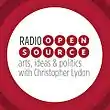Open Source (radio show)
Open Source is an American public radio show hosted by Christopher Lydon, former New York Times journalist and original host of The Connection.[1] The show focuses on the arts, literature, and foreign affairs.
 | |
| Genre | News: Arts, literature, foreign affairs |
|---|---|
| Running time | 60 minutes |
| Country of origin | United States |
| Language(s) | English |
| Home station | WBUR |
| Syndicates | PRX |
| Hosted by | Christopher Lydon |
| Created by | Christopher Lydon Mary McGrath |
| Produced by | Mary McGrath Conor Gillies |
| Executive producer(s) | Mary McGrath |
| Original release | 2005 – present |
| Website | radioopensource.org |
| Podcast | www.radioopensource.org/feed/ |
History
In May 2005, Christopher Lydon and his longtime producer Mary McGrath partnered with University of Massachusetts Lowell's radio station WUML, WGBH (FM), and Public Radio International to produce Open Source as a daily call-in radio program. The show was syndicated by 32 NPR stations, before it was canceled on October 16, 2006.[2] In 2007, Lydon moved to Brown University's Watson Institute for International Studies to podcast hourlong conversations under the name Open Source.[3] In 2013, Lydon and McGrath returned to WBUR to produce Open Source as a weekly show.[4] In 2014, Conor Gillies joined the team as audio producer.
Schedule
Open Source airs twice a week on WBUR, Thursday at 9pm and Sunday at 2pm. The Open Source podcast reaches listeners in over 150 countries each week. Open Source also produces ongoing series on its website, including "Reading Chekhov," a reading of Anton Chekhov's short stories by Boston actors and academics,[5] and "Parachute Radio," international conversations from Ghana, India, Pakistan, Egypt, Jamaica, Singapore and Cuba.[6]
Notable guests
Previous guests in longform conversations have included Philip Roth, Noam Chomsky, Jonathan Lethem, Orhan Pamuk, Cornel West, Harold Bloom, Matt Taibbi, Ha Jin, Paul Krugman, Gordon Wood, Joan Didion, Tim Berners-Lee, Gore Vidal, Megan Marshall, V. S. Naipaul, David Bromwich, John Mearsheimer, Edwidge Danticat, Jeffrey Sachs, Ralph Nader, Elizabeth Warren, Amartya Sen, Norman Mailer, David Foster Wallace and Edward Said.
References
- Joseph P. Kahn (2013-10-20). "After messy split from WBUR, Christopher Lydon returns". The Boston Globe.
- Robert Mills, Sun Staff (2006-10-16). "U-Mass Lowell drops Lydon". The Sun (Lowell). Archived from the original on 2006-10-26.
- "Launching 'Open Source at the Watson Institute'". Watson Institute for International Studies. 2007-11-19. Archived from the original on 2012-03-06. Retrieved 2014-05-22.
- Joseph P. Kahn (2013-10-20). "After messy split from WBUR, Christopher Lydon returns". The Boston Globe.
- "Reading Chekhov".
- "Parachute Radio".